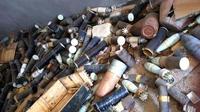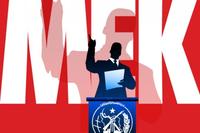-
Israel not invited to a counter-terror forum in Turkey

The Global Counterterrorism Forum (GCTF), established by the Obama administration in September 2011, held its first day of discussions in Ankara, Turkey, last Friday; twenty-nine countries have been invited to join the forum, ten of which are Arab or Muslim countries – but Turkey vetoed the invitation of Israel, and the United States accepted Turkey’s position
-
-
U.S. drones take out al Qaeda’s second in command

In another impressive coup for the U.S. campaign against al Qaeda, missiles launched from a CIA drone Monday morning killed Abu Yahya al-Libi, al Qaeda’s second in command; the killing of al-Libbi closes a circle: following bin Laden’s death, five high-level al Qaeda operatives were considered as potential successors; since last August, the United States has taken out four of them — Ilyas Kashmiri, Abdul Rahman Atiya, Anwar al Awlaki; and now al-Libi; the killing of al-Libi is but the latest manifestation of how the Obama administration has intensified and expanded the campaign against al Qaeda and its affiliates
-
-
Break-away Mali region now under al Qaeda-affiliate control
Following a March 2012 military coup in Mali, Tuareg secessionists in northeast Mali have seized two-thirds of that country — an area larger than France — and proclaimed the Independent State of Azawad; things have not gone as planned: three months after secession, an al Qaeda-affiliated Islamist fundamentalist movement, Ansar Dine, is in control of the vast territory; the Financial Times observes: “[W]hat initially appeared to be a quest for a secular homeland has turned into something much more dangerous, for Mali and far beyond: the possibility of an Islamist-aligned mini-state that could offer a base to the jihadist groups and criminal gangs that roam the Sahara”
-
-
Talks with Iran: window for peaceful resolution closing
The second round of talks between the five permanent members of the Security Council plus Germany and Iran over the military dimensions of Iran’s nuclear program opened yesterday in Baghdad; the time frame for the talks between the six powers and Iran is tacitly accepted by all sides: if the current round of talks fails, and the harsher sanctions on Iran, which go into effect on 1 July, do not persuade Iran, by the end of the year, to cease and desist its nuclear weapons activities, then the path will be clear for a military attack on Iran – by Israel, the United States, or both – sometime during the first three or four months of 2013
-
-
Sinai Peninsula lawlessness worries terrorism experts

The other day, Egyptian forces seized a large quantity of weapons near the Libyan border; Egypt says the large weapon shipment was bound for the Sinai Peninsula further to destabilize the area and stir up trouble ahead of upcoming presidential elections
-
-
Detecting a North Korea nuclear test
The monitoring tools that scientists have available to them to detect a nuclear test have improved in quality and quantity since North Korea last tested a nuclear weapon in 2009; the Comprehensive Test Ban Treaty Organization (CTBTO) has a total of 287 detection facilities available, consisting of 157 seismic monitoring stations, forty-five infrasound stations, sixty-five radionuclide stations, and ten hydroacoustic stations
-
-
Study challenges Russian investigation of Smolensk plane crash

A new study by a team of experts of the 10 April 2010 plane crash near Smolensk, Russia, in which the Polish president, his wife, nine NATO generals and others were killed, raises pointed questions about the conclusions of the official Russian investigation into the incident, and points to contradictions and discrepancies in the report
-
-
First U.S. drone attack in Pakistan in a month kills four terrorists
Yesterday, Sunday, missiles launched from a CIA drone missiles hit military targets in Pakistan for the first time in a month. The attack killed four al Qaeda members, but further heightening tensions between the United States and Pakistan. Back in November 2011, U.S. airstrikes, called in by Pakistani commanders n the ground, killed twenty-four Pakistani soldiers. In response, Pakistan said that unless the United States apologized for the incident, no more U.S. drone attack would be allowed against terror targets inside Pakistan. The United States expressed regrets over the death of the soldiers, but refused to apologize, saying the accident was the result of mistakes and miscommunication on both sides. Since November, the United States has reduced considerably the number of drone attacks inside Pakistan, but has refused to end such attacks altogether. The U.S. refusal has led to Pakistani parliament, on three different occasions, to pass resolutions calling upon the United States to cease and desist.
-
-
Threat of imminent Israeli, U.S. attack on Iran appears to recede
The New York Times reports today that analysts inside and outside the Obama administration believe that there is less likelihood now – relative to how things looked in the winter — that either Israel or the United States would launch a military strike against Iran’s nuclear facilities. The reasons: the economic sanctions on Iran are slowing the Iranian economy, with more draconian sanctions coming in July; the mood in the first round of talks between Iranian and Western representative, who met in Ankara two weeks ago, was positive, and there is some optimism that the next round, to be held in Baghdad in a month time, may yield Iranian concessions on the issue of uranium enrichment; also, there is a growing schism in Israel between, on one side, political leaders – namely, Prime Minister Benjamin Netanyahu and Defense Minister Ehud Barak – and, on the other side, both former and current military and intelligence officials about the wisdom of attacking Iran now, before diplomacy and tough sanctions have been given a chance.
-
-
Sanctions unlikely to affect Iran’s nuclear aim
The likelihood of economic sanctions persuading the Iranian leadership to abandon its quest for nuclear weapons is very low; the record of economic sanctions is not good: long-standing international sanctions remain in place against North Korea, Ivory Coast, and Somalia without noticeable effects on their policies; embargoes against Serbia and Libya ended, as with Iraq, only after military intervention forced change
-
-
Post-communist depression
A new study reveals how a radical economic policy devised by Western economists put former Soviet states on a road to bankruptcy and corruption
-
-
Nuclear summit focuses on terrorist nukes

The Seoul nuclear summit focused on the risk of nuclear terrorism; there are two risks: first, fissile materials, which terrorists may use to construct a dirty bomb, is kept at thousands of medical, research, and industrial facilities around the world – often without sufficient security; second, constructing a Hiroshima-type bomb is not as difficult as we may think
-
-
U.S, Israel employ shady organization against Iran

Analysts have concluded that the United States and Israel may be in a strategic alliance with a former left-wing Iranian political group instrumental in the 1979 Islamic Revolution and the overthrow of Shah Rezi Pahlavi; the purpose of the alliance is to destabilize the current regime in Iran
-
-
The Transboundary Agreement is not just about the cost of gas and the environment
The Transboundary Agreement, which the United States and Mexico reached on 20 February, regulates oil and gas development in the Gulf of Mexico; before the agreement is ratified, there is a need to address serious security issues related to building more oil rigs in the Gulf – for example, the fact that the Mexican government cannot control its powerful criminal organizations, and that it will be easy for terrorists in a small boat to overrun one of these deepwater rigs
-
-
CDC: outbreaks linked to imported foods increasing
U.S. food imports grew from $41 billion in 1998 to $78 billion in 2007; as much as 85 percent of the seafood eaten in the United States is imported, and depending on the time of the year, up to 60 percent of fresh produce is imported; the increase in imported food has been accompanied by an increase in foodborne illnesses, with fish and spices the most common sources
-
More headlines
The long view
No Nation Is an Island: The Dangers of Modern U.S. Isolationism
The resurgence of isolationist sentiment in American politics is understandable but misguided. While the desire to refocus on domestic renewal is justified, retreating from the world will not bring the security, prosperity, or sovereignty that its proponents promise. On the contrary, it invites instability, diminishes U.S. influence, and erodes the democratic order the U.S. helped forge.
Fragmented by Design: USAID’s Dismantling and the Future of American Foreign Aid
The Trump administration launched an aggressive restructuring of U.S. foreign aid, effectively dismantling the United States Agency for International Development (USAID). The humanitarian and geopolitical fallout of the demise of USAID includes shuttered clinics, destroyed food aid, and China’s growing influence in the global south. This new era of American soft power will determine how, and whether, the U.S. continues to lead in global development.
Water Wars: A Historic Agreement Between Mexico and US Is Ramping Up Border Tension
As climate change drives rising temperatures and changes in rainfall, Mexico and the US are in the middle of a conflict over water, putting an additional strain on their relationship. Partly due to constant droughts, Mexico has struggled to maintain its water deliveries for much of the last 25 years, deliveries to which it is obligated by a 1944 water-sharing agreement between the two countries.
How Disastrous Was the Trump-Putin Meeting?
In Alaska, Trump got played by Putin. Therefore, Steven Pifer writes, the European leaders and Zelensky have to “diplomatically offer suggestions to walk Trump back from a position that he does not appear to understand would be bad for Ukraine, bad for Europe, and bad for American interests. And they have to do so without setting off an explosion that could disrupt U.S.-Ukrainian and U.S.-European relations—all to the delight of Putin and the Kremlin.”
